
1. THE BUREAUCRATIC THEORY
1.1. Fathered by: Max Weber
1.1.1. A system that is mainly designed by a hierarchy of domination and control
1.1.1.1. TYPES OF DOMINATION: traditional, charismatic and legal domination
1.1.1.2. PURPOSE: banish favouritism,sustain order and expand efficiency
1.1.1.3. CRITICISMS: inflexible,candid,impersonal
2. SCIENTIFIC MANAGEMENT THEORY
2.1. Fathered by: Fredrick Taylor
2.1.1. Uses science to examine the most logical production process to grow productivity
2.1.1.1. PRINCIPLES: Select,Train,Teach and develop employee
2.1.1.1.1. SOME CONTRIBUTIONS/PHILOSOPHY Specialisation,Standardisation, Planning,Technique
3. THE BEHAVIOURAL THEORY
3.1. Fathered by: Abraham Maslow
3.1.1. ELEMENTS: psychology,sociology, enthography
3.1.1.1. All behaviour is grasped from interacting with the environment
3.1.1.1.1. HIERARCHY OF NEEDS: self actualisation , esteem needs, love needs,safety needs, physiological
3.1.1.1.2. PURPOSE: To accommodate and promote needs of human beings
4. HUMAN RELATIONS THEORY
4.1. Fathered by: Elton Mayo
4.1.1. This theory prioritises the psychological and social features of the employee as an individual and his team
4.1.1.1. ELEMENTS OF THEORY: the individual,work groups, participative management
4.1.1.2. PURPOSE: to increase productivity via employee happiness
4.1.1.3. CRITICISMS:Failure in bigger economic, technological and social factors on production
5. SYSTEMS THEORY
5.1. Fathered by: Ludwig von Bertalanffy
5.1.1. Holistic approach, interdisciplinary study of systems. Takes into account the environment
5.1.1.1. Open systems that interlink with their environments for survival
5.1.1.1.1. CRITICISMS: Doesn’t leave enough space for the human factor.
6. THE CLASSICAL THEORY
6.1. Fathered by: Henri Fayol
6.1.1. Traditional theory, highlights more of the org rather than employee
6.1.1.1. ELEMENTS: organising,planning,co ordination,control and command
6.1.1.1.1. PRINCIPLES 5 of 14: Discipline, centralisation, equity, Order and initiative
6.1.1.1.2. CRITICISMS: promotes “one size fits all” ,sees humankind as passive, doesn’t thrive in an org where change is common
7. CONTINGENCY THEORY
7.1. Fathered by: Fred Edward Fredler
7.1.1. Believes there is no top way to arrange a corporation, guide a company or construct decisions
7.1.1.1. CRITICISMS: no flexibility, complicated
